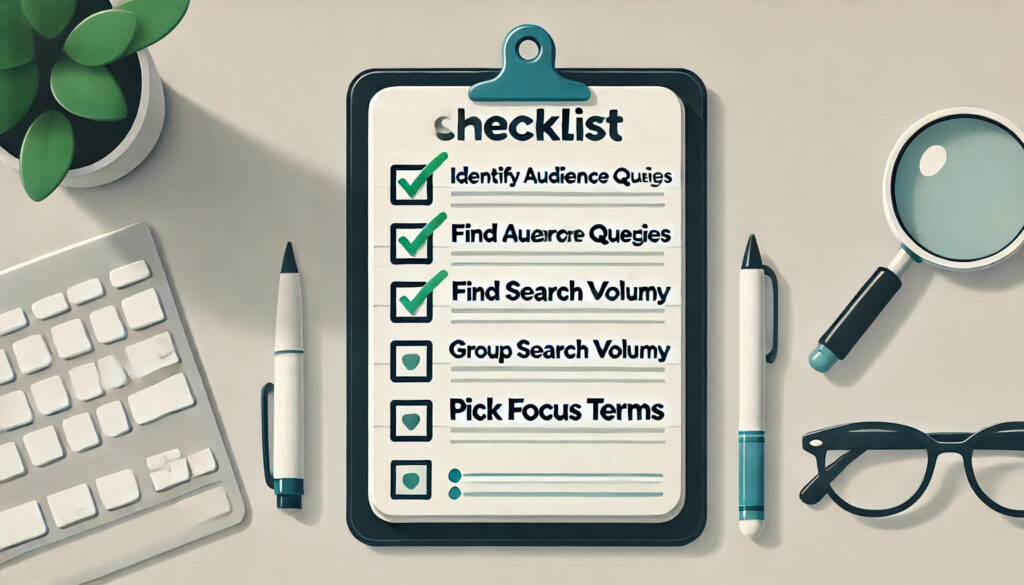Search Engine Optimization (SEO) can feel overwhelming when you’re just getting started. From technical audits to backlink building, there are many moving parts. But if you’re wondering what is the first thing to do in SEO, the answer is clear and consistent across all expert opinions: keyword research.
This foundational step gives your entire SEO effort purpose and direction. Without it, you’re essentially writing into the void. Let’s explore why keyword research is the first thing to do in SEO — and how skipping it can make all your efforts fall flat.

Table of Contents
🎯 Why Keyword Research Comes First in SEO
1. It Helps You Understand Your Audience
Before you optimize for search engines, you must understand what your audience is actually searching for. Keyword research reveals:
- What phrases users type into search engines
- How frequently these terms are searched
- The intent behind each query (informational, navigational, transactional)
This user-centric approach aligns your content with real demand, not assumptions — and that’s why it’s the first thing to do in SEO for any business, blog, or brand.

✅ Example: Instead of guessing that users want “best running shoes,” you may find they search more for “Nike Air Zoom review” — giving you a more targeted content idea.
2. It Shapes Your Entire Content Strategy
With keyword research, you can:
- Create content clusters based on related terms
- Identify long-tail keywords with low competition
- Avoid writing duplicate or low-interest content
You’ll also be able to map keywords to search intent, ensuring each page serves a clear purpose. This strategic clarity is why experts agree: keyword research is the first thing to do in SEO.

🧠 Expert Insight: According to Moz, “Keyword research is the blueprint for your online marketing efforts, driving every decision you make.”
Also Read:
Does SEO Cost Money? The Ultimate Guide to Free vs Paid SEO in 2025
3. It Sets the Stage for On-Page and Technical SEO
Many think SEO begins with on-page tweaks like titles and meta descriptions. But without keyword data, those optimizations lack strategic value.
With keyword research, you can:
- Write SEO titles that match search queries
- Optimize meta descriptions with relevant terms
- Structure content using targeted headings (H2, H3)
- Plan internal linking between related topics
Even your URL structures and image alt texts benefit from a solid keyword foundation. That’s why the first thing to do in SEO is always keyword research, not just tweaking code or site speed.
🛠️ How to Do Keyword Research (Step-by-Step)
Step 1: Brainstorm Topics Related to Your Business
Think about:
- What products/services do you offer?
- What problems do your users face?
- What questions do they ask?
This brainstorming lays the groundwork for identifying the first thing to do in SEO — uncovering what people are actually looking for.
Step 2: Use Keyword Research Tools
Here are some tools to get started:
- Google Autocomplete & “People Also Ask”
- Ubersuggest
- Ahrefs or SEMrush
- Google Keyword Planner (especially useful if you’re running Google Ads)

💡 Tip: Don’t just look for high-volume keywords. Check Keyword Difficulty (KD) and Search Intent too — core principles that guide the first thing to do in SEO effectively.
Step 3: Group and Organize Your Keywords
Cluster related keywords into content groups. For example:
- Main Topic: Digital Marketing
- Subtopics: SEO basics, social media strategy, email marketing tools
This approach helps you build a content silo, improving both SEO and user experience — and reinforces why keyword grouping is part of the first thing to do in SEO.
Step 4: Select Focus Keywords for Each Page
Every page should have:
- One primary keyword
- 3–5 secondary keywords
This ensures clarity for both Google and your readers. Selecting focus keywords is not just helpful — it’s the first actionable thing to do in SEO when publishing a new page.
📋 First SEO Task Checklist: TL;DR

| Task | Why It Matters |
|---|---|
| Identify relevant keywords | Understand what your audience is searching for |
| Analyze search volume & intent | Choose topics that drive the right traffic |
| Group keywords into topics | Create focused, topic-rich content |
| Pick a focus keyword per page | Guide your on-page and technical SEO efforts |
When you ask “what’s the first thing to do in SEO?” — this checklist answers it.
📚 Why Not Start With Technical SEO?

While site structure, speed, and crawlability are essential, they serve as enablers. You can’t optimize pages, build backlinks, or improve rankings unless you know which keywords matter.
That’s why most successful strategies begin with this critical question:
👉 What is the first thing to do in SEO?
✅ The answer — keyword research.
🗣️ Quote: “If SEO is a journey, then keyword research is the map.” — Neil Patel
🙋 Frequently Asked Questions (FAQs)
Can I skip keyword research if I already know my niche?
Even if you know your niche, search trends and queries evolve. Keyword research keeps your content data-driven rather than assumption-based.
What happens if I skip keyword research in SEO?
You might:
✅Target the wrong search terms
✅Miss high-intent buyers
✅Waste time on content that doesn’t rank
✅Struggle to outperform competitors
What’s the best free tool for keyword research?
Google Keyword Planner (for search volume) and AnswerThePublic (for question-based keywords) are great free options. Ubersuggest also offers useful free-tier data.
Should I target short-tail or long-tail keywords first?
Start with long-tail keywords (e.g., “best running shoes for flat feet” vs. “running shoes”) because they:
✅Have lower competition
✅Attract more qualified traffic
✅Convert better
How many keywords should I target per page?
Focus on 1 primary keyword + 2-3 related secondary keywords per page. Avoid keyword stuffing—Google prioritizes natural content.
✅ Final Thoughts
When it comes to SEO, the first thing to do isn’t installing plugins or writing blog posts blindly — it’s keyword research.
It informs everything you do next — from crafting content and structuring your website to attracting qualified traffic and climbing search rankings.
By understanding what people are looking for, you’re not just optimizing for search engines — you’re creating value for your audience.
🎯 Ready to grow your site’s traffic?
Start with a solid keyword research plan — because the first thing to do in SEO is the one step that unlocks all the others.

